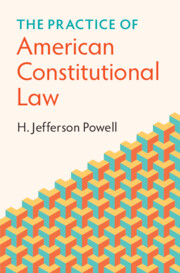7 results
26 - Emergency Powers
- from Part II - Modalities
-
-
- Book:
- The Cambridge Handbook of Constitutional Theory
- Published online:
- 27 March 2025
- Print publication:
- 24 April 2025, pp 433-450
-
- Chapter
- Export citation
2 - Identifying the Problem
-
- Book:
- The Practice of American Constitutional Law
- Published online:
- 05 May 2022
- Print publication:
- 19 May 2022, pp 17-38
-
- Chapter
- Export citation

The Practice of American Constitutional Law
-
- Published online:
- 05 May 2022
- Print publication:
- 19 May 2022
11 - Digital Home Health During the COVID-19 Pandemic
- from Part III - Designing Medical Device Regulations
-
-
- Book:
- The Future of Medical Device Regulation
- Published online:
- 31 March 2022
- Print publication:
- 07 April 2022, pp 141-160
-
- Chapter
-
- You have access
- Open access
- HTML
- Export citation
Chapter 8 - Corporate Persons without Authorization
-
-
- Book:
- Hobbes's <I>On the Citizen</I>
- Published online:
- 15 November 2019
- Print publication:
- 05 December 2019, pp 145-160
-
- Chapter
- Export citation
Collective responsibility and the state
-
- Journal:
- International Theory / Volume 1 / Issue 1 / March 2009
- Published online by Cambridge University Press:
- 01 March 2009, pp. 119-154
-
- Article
- Export citation
The Economic Implications of Validating Unauthorised Contracts made by Corporate Agents
-
- Journal:
- European Business Organization Law Review (EBOR) / Volume 4 / Issue 1 / July 2003
- Published online by Cambridge University Press:
- 10 February 2004, pp. 51-81
- Print publication:
- July 2003
-
- Article
- Export citation

